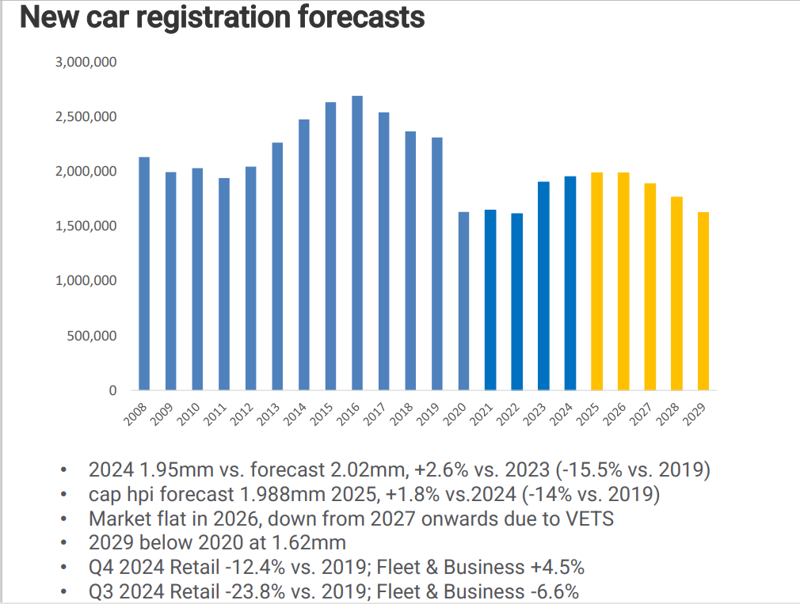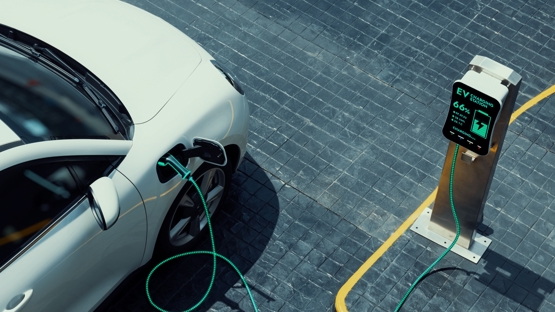The impact of zero emissions legislation will see the number of new cars sold in the UK languish for at least the next five years, according to an industry forecasting expert.
Dylan Setterfield, forecast strategy chief at Cap HPI, delivering the business’ latest market update, said that in contrast with the Society of Motor Manufacturers and Traders’ (SMMT) initial projections that car registrations will this year rise 4.6% to 2.06 million units – the first time over the two million mark since the pre-Covid 2019 – the actual picture will be bleaker.
Not only does Cap HPI forecast 1.988m cars will be registered in 2025 – an 1.8% increase on 2024 figures which is still 14% less than in 2019 – but that the market will continue to flat-line next year before shrinking further from 2027 onwards due to the impact of the UK Government’s ZEV Mandate. Even in 2029, there will be fewer new cars sold than in the Covid-stricken year of 2020 with only 1.62m registered.
The impact of zero emissions legislation will see the number of new cars sold in the UK languish for at least the next five years, according to an industry forecasting expert.
Dylan Setterfield, forecast strategy chief at Cap HPI, delivering the business’ latest market update, said that in contrast with the Society of Motor Manufacturers and Traders’ (SMMT) initial projections that car registrations will this year rise 4.6% to 2.06 million units – the first time over the two million mark since the pre-Covid 2019 – the actual picture will be bleaker.
Not only does Cap HPI forecast 1.988m cars will be registered in 2025 – an 1.8% increase on 2024 figures which is still 14% less than in 2019 – but that the market will continue to flat-line next year before shrinking further from 2027 onwards due to the impact of the UK Government’s ZEV Mandate. Even in 2029, there will be fewer new cars sold than in the Covid-stricken year of 2020 with only 1.62m registered.
Setterfield said: “We don’t think we’ll get to the 2 million market the SMMT is predicting for 2025 and by the time we get to 2029 we think we’re going to be marginally below the COVID affected year of 2020.”
SMMT data for 2024 showed the new car market ended at 1.953 million units, up 2.6% year-on-year, of which 382,000 were zero emission battery electric vehicles. That result gave BEV a record market share of 19.6%.
But that record performance, driven by significant discounts and incentives which the SMMT said were unsustainable, was still almost 3ppts short of the Government-set target of a 22% share, even after a final push that created a 31% BEV mix in December’s market to boost the tally.
The target increases to 28% BEV share this year which will require a sales uplift of 46% and the requirement to find customers for more than 550,000 new electric cars assuming the total market volume remains flat.
That means that some carmakers’ national sales companies will continue to be liable fines of £15,000 for every car not meeting the 28% target this year, if they cannot pool, trade or borrow zero carbon credits from other vehicle manufacturers which have exceeded the target.
“Even factoring in continued CO2 improvements, this year looks like it’s going to be more challenging than last year with the move from a 22% target in 2023 to 28% in 2025. Another thing to bear in mind is that those CO2 credits can only be applied up until 2026,” said Setterfield.
“Things look slightly less difficult in 2026 in relative terms. 2027, on the face of it, appears easier still. But once you factor in the fact that those CO2 credits can no longer be applied, it’ll almost certainly be a tougher task in 2026.”
“And then we get to 2028 – moving from that target of 38% in 2027 to 52% which represents a 37% increase. It’s hard to see how you can achieve that in a natural market, especially since by that stage of the adoption curve, we’re going to have to start moving into the segment of the population that are unable to charge at home.”
He said it would take significant intervention from government, and probably also “a sea change” in attitudes for buyers and sellers alike.
“2028 could be a crucial year, if nothing else changes before then, but maybe the powers that be recognise by 2027 that it’s not going to work in its current format. They can either change the plan. They can try a carrot instead of a stick, or maybe they double down and they tax petrol and diesel cars to high heaven. Either way, it’s really hard to see how this is going to work in its current form.”
He said the annual sales rate had increased up till July in 2024, but then had started to fall away, with the year ending up at 1.95m new car registrations, which while 2.6% up on 2023 was still 15.5% down on 2019.
“Our forecast for this year is a further increase of 1.8% up to 1.988m and that’s based on a continuation of salary sacrifice boosting fleet sales at the expense of retail but with improving consumer confidence slowing the rate of reduction in private sales,” he said, adding that while fleet sales will continue to increase healthily, it will be at a slower rate than in 2024.
“Reading further forward, we think we flatten off in 2026 before overall reductions in new car sales from 2027 onwards with petrol and diesel models increasingly discontinued.”
“Of course, all this is assuming we don’t get material changes to the targets and the structure of the ZEV mandate,” he said, referencing the government’s announcement of the fast-track consultation on the future of the ZEV Mandate,
“It sounds like we’re unlikely to see any change in the percentages by year. All the noises have been that they’re not going to make changes to the targets by year. It seems like they may make changes to the level of the fines or they may also try to introduce some new kind of credit which would reward people who are active in the UK,” he said.
He added that there was a prospect of the VED expensive car supplement applying to BEVs costing over £40,000 from April being revised in 2025, adding: “The obvious one being we could probably with the VAT being harmonised between domestic and public charging.”
The next SMMT outlook is scheduled to be next revised in January 2024 and the results will be posted by 5 February.

Login to continue reading
Or register with AM-online to keep up to date with the latest UK automotive retail industry news and insight.

